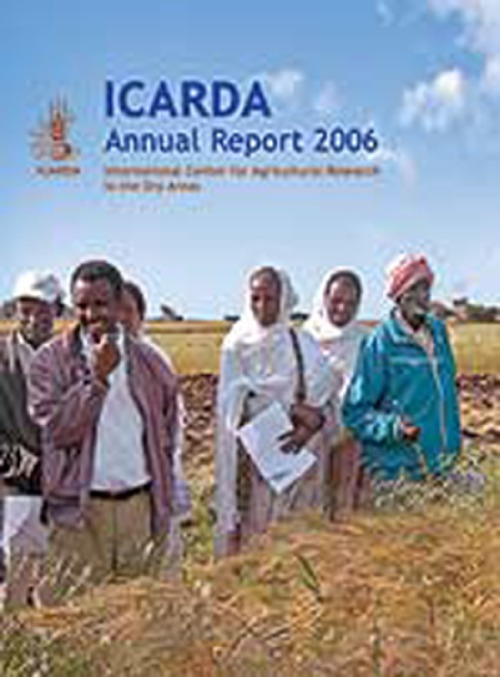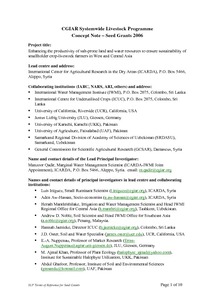Location
The International Center for Agricultural Research in the Dry Areas (ICARDA) was established in 1977. It is one of 15 such centers supported by the CGIAR. ICARDA’s founding mandate to promote agricultural development in the dry areas of developing countries remains highly relevant today.
ICARDA works with a tight focus on the problem-solving needs of resource-poor farmers, achieving this through the in-field delivery of its research outputs. Although global food production has increased by 20 per cent in the past decade, food insecurity and poverty remain widespread, while the natural resource base continues to decline.
International research centers such as ICARDA, which have helped drive previous improvements, continue to deliver new technologies to support sustainable growth in agriculture, and crucially, to work with a wide range of partners to accelerate the dissemination of these technologies.
ICARDA’s biggest strength is its staff – 600 highly skilled men and women from 32 countries. Our research and training activities cover crop improvement, water and land management, integrated crop-livestock-rangeland management, and climate change adaptation.
Other interventions include:
- Water harvesting - supplemental irrigation and water-saving irrigation techniques
- Conservation agriculture methods to reduce production costs and improve sustainability
- Diversification of production systems to high-value crops – horticulture, herbal and medicinal plants
- Integrated crop/rangeland/livestock production systems including non-traditional sources of livestock feed
- Empowerment of rural women – support and training for value-added products.
The ICARDA genebank holds over 135,000 accessions from over 110 countries: traditional varieties, improved germplasm, and a unique set of wild crop relatives. These include wheat, barley, oats and other cereals; food legumes such as faba bean, chickpea, lentil and field pea; forage crops, rangeland plants, and wild relatives of each of these species.
ICARDA’s research portfolio is part of a long-term strategic plan covering 2007 to 2016, focused on improving productivity, incomes and livelihoods among resource-poor households.
The strategy combines continuity with change – addressing current problems while expanding the focus to emerging challenges such as climate change and desertification.
We work closely with national agricultural research systems and government ministries. Over the years the Center has built a network of strong partnerships with national, regional and international institutions, universities, non-governmental organizations and ministries in the developing world and in industrialized countries with advanced research institutes.
THE ‘DRY AREAS’
Research and training activities cover the non-tropical dry areas globally, using West Asia, North Africa, Central Asia and the Caucasus as research platforms to develop, test, and scale-out new innovations and policy options.
Dry areas cover 41 per cent of the world’s land area and are home to one-third of the global population. About 16 per cent of this population lives in chronic poverty, particularly in marginal rainfed areas. The dry areas are challenged by rapid population growth, frequent droughts, high climatic variability, land degradation and desertification, and widespread poverty. The complex of relationships between these challenges has created a "Poverty Trap."
Members:
Resources
Displaying 406 - 410 of 431ICARDA Annual Report 2006
ICARDA witnessed several important developments in 2006. Of these, the Fifth External Program and Management Review (EPMR) was the most significant, as it provided a comprehensive assessment of the Center's global activities, as well as new insights and dimensions that helped refine ICARDA's new Strategic Plan for 2007- 2016. The EPMR coincided with a transition in the governance and leadership of ICARDA.
Selection and Characterization of Badia Watershed Research Sites
This report describes the use of improved methodologies developed for identifying water-harvesting sites. It also provides general guidelines for determining site potential in relation to various parameters. The approach integrates multi-disciplinary knowledge, use of GIS, and verification in the field to develop and test a methodology to identify watersheds with specific characteristics – in this case, watersheds most suited to project activities within the Jordanian Badia.
Fighting Land Degradation in the Drylands: NRM Technologies for Crop– Livestock Farming
A tragedy of the commons is unfolding in the rangelands of West Asia and North Africa (WANA), where land is either public or collectively owned. Overgrazing under this land tenure has led to severe land degradation and soil erosion. Poverty and environmental degradation are intertwined in this low-rainfall region, where more than 38 million people live in rural areas and depend mainly on agriculture. Traditional rangeland grazing provides fodder in winter and spring, while in summer and autumn the animals browse cereal stubble and other crop residues.
ICARDA Annual Report 2005
The year 2005 was an important milestone in the efforts of ICARDA and its partners in meeting the global challenges of agriculture in dry areas through the application of science. In an assessment of all 15 CGIAR Centers (based on science quality and relevance, impacts, partnerships, and financial and institutional health), conducted by the CGIAR in collaboration with the Science Council and the World Bank, ICARDA was rated outstanding" - one of only two centers to receive this rating.







